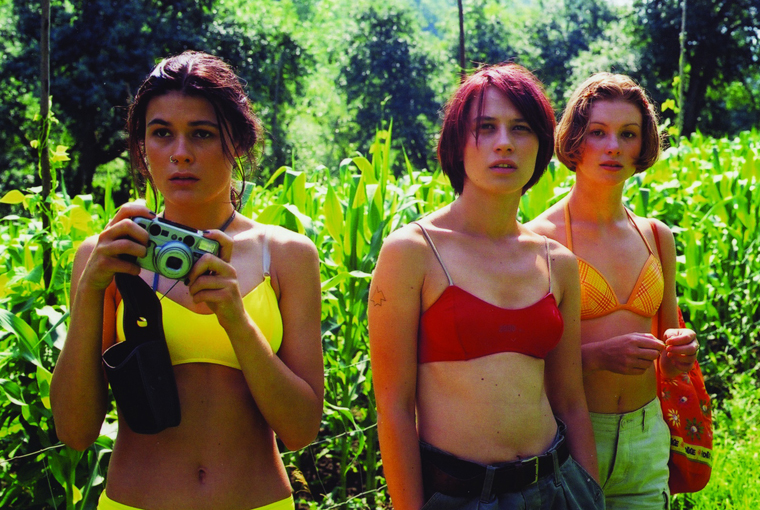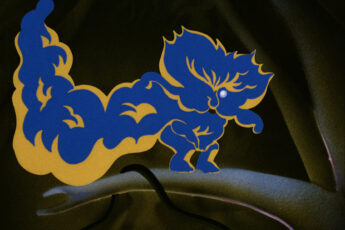Slovenian Queer Canoe Trip Surrealism
Maja Weiss’ Guardian of the Frontier (Varuh Meje, 2002)
Vol. 135 (May 2023) by Julia Skala
As per tradition, Sundays at the goEast film festival in Wiesbaden start with the carefully curated Matinée screening in the historic Caligari movie theater. This year, its dark velvet curtains opened to reveal Guardian of the Frontier, screened on analogue film in all its warm summer colors and in the presence of director Maja Weiss.
In her Guardian of the Frontier, a remarkable Slovenian film from 2002, three college girls embark on a summer canoe trip down the Slovenian river Kolpa. What begins as a careless, bright summer trip, soon turns into a fearful flight from the dangers of the border and its peculiar guardian.
Alja, Zana and Simona are friends from school. When they reunite for a summer canoe and camping trip down the river Kolpa, Alja’s father repeatedly warns them about a college girl having gone missing in the woods near the border. They ignore the warnings, and the misgivings of chronically worried Simona, and set out on their trip. Alja’s boyfriend drives them to the river and, after a clumsy farewell, it’s just the girls and the beauty of Slovenian nature.
The girls’ initial feeling of freedom and carelessness while paddling comes to a first test when they hear gunfire near the border to Croatia. While Zana and Alja are very close and even flirtatious, Simona feels uncomfortable with their liberal and sometimes cynical attitude. Simona’s naiveté is frequently made fun of, which is why she often wanders by herself. On one of her strolls, she encounters a mysterious fisherman, later referred to as „the King of the Forest”. The fisherman is tightly holding a fish over his crotch as Simona gazes at him, completely hypnotized and in awe. The sexually charged scene reveals Simona’s desires as less naively pure than they seemed to be.
During an evening campfire, Zana kisses Alja, who pushes her away and rejects her, given that she is in a relationship. Simona is shocked when she witnesses the scene and flees into the dark forest, following a mysterious fishing line. She discovers a woman’s shoe in the water. While searching for their friend, Zana and Alja stumble upon the shoe as well. The abandoned object convinces them of the presence of a rapist – the King of the Forest – and of being followed, not least due to Simona having made eyes at him.
Simona’s obsession with the of the King of the Forest, who is sometimes depicted as a deer with impressively huge antlers in the misty, gloomy forest at night, makes her mental health appear growingly unreliable to her friends.
Simona’s (Iva Krajnc) prudery and shyness is offset by her strong desire to be appealing and pleasing to men. Zana (Pia Zemljič) is her counterpart. She is rebellious, loud, provocative, and confident. She takes whatever she wants, unafraid of the consequences or of being disliked by anyone, particularly by men. Alja (Tanja Potočnik) seems to be constantly torn between both sides. She is neither as naturally careless as Zana nor as inhibited as Simona. She also does not want to betray her boyfriend and is afraid of what people might think of her.
Each girl’s pursuit of her sexual desires ultimately leads to the unraveling of their friendship and relationships. As director Maja Weiss described in our interview, the personality traits and inner conflicts that define the female characters in Guardian of the Frontier, are sides that every woman unites in herself on different levels. At times, the film reads like a utopia, a dreamlike fantasy of idyllic nature and carelessness. Yet, these lofty qualities quickly reveal a dystopian side of horror, fear and, finally, violence. This polar experience of reality helps to create an unsettling ambivalence.
Guardian of the Frontier excels in depicting the characters’ emancipation from sexual inhibition. The girls’ individual values are clear-cut, and they cannot throw them overboard lightly. They do not impulsively put themselves into situations that they are obviously longing for; they are held back by their conscience, by societal conventions and fears. For example, when Simona gazes at the fisherman, she does not follow through on her sexual fantasy. Or, when Alja is kissed by Zana and their attraction is clearly mutual, again, her conscience and fear of her own queerness is holding her back. The characters evolve throughout the film and slowly overcome boundaries that were initially holding them back.
The wanton longing that all three girls share is especially tangible with Simona, whose sexual fantasies finally evolve into a nightmarish fever-dream. The conflict of overcoming sexual inhibitions is paired with the theme of feeling safe or threatened. The girls’ fragility is repeatedly represented by the exposure of their bodies. Alja and Zana are paddling topless, casually free and emancipated, until they hear gunfire and realize that someone may be watching them.
The film may also convey a more political side as it deals with the fear of the “other”. This includes fear of the sexual other, homophobia, as well as prejudices against people crossing the national border. Later in the film, the guardian of the frontier is revealed to be the town’s mayor. In a speech, he criticizes the girls for their independence and use of profanity, emphasizing that homosexuality is not aligned with Slovene nationality. He aims to protect his country from it and differentiates between what he deems right and wrong. In that way, the girls’ journey can also be seen to reveal a fight between progressiveness and conservative patriotism in a country negotiating its identity.
Guardian of the Frontier is a surreal, tense road trip down the Kolpa River. It is a visual feast, providing warm, saturated colors that make the physical and sensual summer heat very tangible. It is charged with questions about identity – of the young women and by extension of a nation in search of a new identity. The film, with its surreal and mysterious elements, captures the spirit of the 2000s and thus compares to films like American Beauty or Mulholland Drive, though it offers a uniquely female perspective.




Leave a Comment